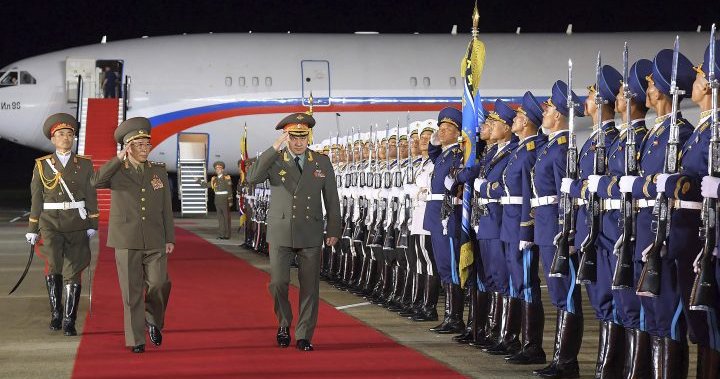
North Korea hosting Chinese, Russian delegations for Korean War armistice
Global News
The visits suggest North Korea is further opening up after years of pandemic isolation and is eager to showcase its partnerships with authoritarian neighbours.
Russia and China are sending government delegations to North Korea this week for events marking the 70th anniversary of the armistice that halted fighting in the 1950-53 Korean War.
The visits suggest North Korea is further opening up after years of pandemic isolation and is eager to showcase its partnerships with authoritarian neighbors in the face of deepening nuclear tensions with Washington, Seoul and Tokyo.
North Korea’s state media said Wednesday that a Russian delegation led by Defense Minister Sergei Shoigu arrived in Pyongyang Tuesday evening, where they were greeted by senior North Korean officials including Defense Minister Kang Sun Nam.
Russia’s Defense Ministry said in a statement that Shoigu later held a meeting with Kang for talks that he said would “help strengthen cooperation between our defense departments.” Video footage from Russian media showed Shoigu and other Russian delegates laying wreaths at a Soviet war monument in Pyongyang and saluting the city’s statues of Kim Il Sung and Kim Jong Il, respectively the grandfather and father of current North Korean leader Kim Jong Un.
China’s ruling Communist Party is also sending a midlevel official, Li Hongzhong, in hopes of restoring exchanges between the allies.
North Korea has been preparing huge celebrations of the anniversary that are likely to be capped off by a military parade in the capital, Pyongyang, where Kim Jong Un could showcase his most powerful, nuclear-capable missiles designed to target neighboring rivals and the U.S.
Pyongyang’s official Korean Central News Agency said that Kim and his top defense and foreign policy officials visited two cemeteries, including one for Chinese troops who died while fighting alongside North Korea during the war.
Kim expressed gratitude for the Chinese soldiers who dedicated their lives to repel imperialist aggression, calling them “martyrs” who would be “immortal in the hearts of the Korean people.”











